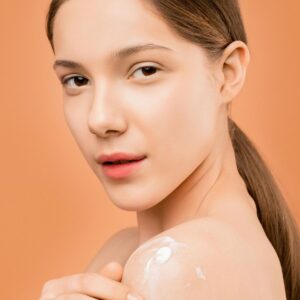Natural vs Chemical Skincare: What Really Works and What’s Just Hype?
1. Is “Natural” Always Better for Your Skin?
- “Natural” has become a buzzword in today’s beauty industry. Plant-based, organic, or DIY skincare products are becoming more and more popular among consumers who think that natural is superior. Is that always the case, though? The response is more complex than most advertising implies.
- Natural vs Chemical Skincare I frequently witness the conflation of “natural” and “safe” as a skincare formulator with experience in both natural and synthetic components. The truth is that not all synthetic substances are harmful to your skin, and not all natural ingredients are inherently beneficial. Despite being natural, poison ivy has no place in your skincare regimen. On the other hand, when utilized correctly, substances like hyaluronic acid—which are frequently synthesized—are extremely safe and useful.

- The idea that “natural” skincare is kinder is among the most common myths. Certain natural extracts, however, have the potential to be quite strong and irritating to delicate skin.
- For instance, improper use of essential oils can result in allergic responses, redness, or photosensitivity.
- However, lab-made chemicals are produced with specified molecular structures, purity, and consistency, which helps to successfully address skin conditions with fewer variables.
- Skin type is another crucial consideration. Compared to a natural willow bark extract, which includes the same chemical but in a less regulated form, synthetic salicylic acid may provide relief for someone with acne-prone skin.
- Similar to this, moderate synthetic PHA may be a safer option for exfoliating skin conditions like rosacea or eczema than natural fruit enzymes.
- Additionally, product stability is a concern. Natural formulations often lack strong preservatives, which can lead to bacterial growth and skin infections — ironically making them more harmful.
- Synthetic preservatives like phenoxyethanol or ethylhexylglycerin are often added at safe concentrations to ensure product longevity and consumer safety.
- From an environmental standpoint, natural isn’t always sustainable either. Some plant-based ingredients are overharvested, leading to ecological damage.
- Synthetic alternatives can reduce the environmental burden while offering the same skin benefits. For example, squalane derived from olives or sugarcane is now a sustainable and cruelty-free option replacing shark liver oil.
2. The Reality of “Chemical” Ingredients
- In skincare conversations, the word “chemical” is often used as a scare tactic. Marketing campaigns frequently position “chemical-free” products as the safer, superior choice — but here’s the truth: everything is made of chemicals.
- Even water (H₂O), the most essential and harmless substance, is a chemical compound. This fundamental misunderstanding fuels fear and confusion among consumers.
- As a skincare researcher and ingredient analyst, I can assure you that not all chemicals are dangerous. In fact, many are essential to creating safe, effective, and stable skincare products.
- Think of emollients like glycerin (a humectant that hydrates the skin), or panthenol (provitamin B5), which soothes and moisturizes — both are synthetic in origin, yet widely trusted by dermatologists.

- Let’s talk about synthetic preservatives. These are often demonized, yet they play a critical role in preventing microbial contamination. Without them, products can become breeding grounds for harmful bacteria, yeasts, and molds — especially in warm, humid climates like India.
- Common safe synthetics like phenoxyethanol, sodium benzoate, or potassium sorbate are used in minuscule, regulated amounts that have been extensively tested for safety. The alternative — using no preservatives or relying solely on “natural” ones — can compromise both shelf life and your skin’s health.
- Consistency is yet another important advantage of substances made in a lab. Synthetic substances are standardized, in contrast to plant extracts, which might differ in potency based on growth circumstances and harvest timing.
- As a result, each batch provides the same degree of safety and performance, which is one of the main reasons dermatologists and cosmetic chemists use them to formulate products for skin that is sensitive or prone to issues.
- Additionally, before being put on the market, lab-tested products undergo thorough clinical and dermatological testing.
- These experiments evaluate effectiveness, allergenicity, and irritation potential in a range of scenarios. Synthetically made and thoroughly studied ingredients such as retinoids, ceramides, and niacinamide (vitamin B3) provide obvious skin advantages supported by science rather than just custom.
- It’s also important to remember that many “natural” ingredients need to undergo chemical modification in order to work well in skincare products. For example, ascorbic acid, the pure form of vitamin C, is unstable.
- More stable derivatives, such as magnesium ascorbyl phosphate, were created by scientists; these were still sourced from nature but improved for better distribution and outcomes.
- Crucially, the generalized fear of chemicals overlooks skincare’s actual purpose, which is to protect, nourish, and heal your skin. An ingredient’s worth is determined by how well it works, not by how “natural” it sounds, regardless of whether it originates from a lab or a leaf.
3. Natural Doesn’t Always Mean Safe
- The appeal of natural skincare is strong; plant extracts, handmade masks, and botanical oils all appear to be safe and pure options.
- However, as a skincare educator and cosmetic formulator, I have personally witnessed that natural does not necessarily equate to safety.
- Natural vs Chemical Skincare In actuality, when used improperly, several of the most widely used “natural” chemicals can result in discomfort, allergic responses, or long-term harm.
- First, let’s talk about essential oils. Many essential oils, including tea tree, peppermint, cinnamon, and citrus oils, are strong skin irritants, while being frequently commended for their fragrant and medicinal qualities.
- They include volatile chemicals that, when used undiluted or in sensitive people, can cause contact dermatitis.

- In a similar vein, certain plant extracts, such as lemon juice or witch hazel, are irritating to the skin. Despite being natural, witch hazel frequently contains alcohol, which can dehydrate and interfere with the skin’s moisture barrier.
- When applied directly, lemon juice’s extremely low pH (around 2) might result in chemical burns or severe sun sensitivity. Plants have developed sophisticated defence mechanisms, and those substances can be harsh on human skin. Just because an ingredient comes from a plant doesn’t imply it’s mild.
- The growing popularity of DIY skincare is another significant worry. Homemade scrub, mask, and toner recipes utilising common household items like baking soda, toothpaste, apple cider vinegar, or raw turmeric abound on social media sites.
- Lastly, the absence of stability testing and preservative systems in natural formulations makes them more vulnerable to bacterial development, particularly when water is present. Natural items that are spoiled might do more damage than good, resulting face infections, inflammation, or outbreaks.
- In conclusion, safety shouldn’t be sacrificed for the romanticism of natural skincare. Powerful elements can be found in nature, but their usage requires balance, accuracy, and expertise. When in doubt, choose for natural products that are also stable, tested, and skin-compatible.
- Are you ready for the next section on “Powerful actives found in nature: Neem, Turmeric, Aloe, etc.”?
4. Clean Beauty = Safe + Effective
- Safe + Effective equals Clean Beauty
- More than just a fad, “clean beauty” is a movement that reflects consumers’ rising understanding of the ingredients in skincare products.
- However, the definition of the term is still mainly unregulated, even with its widespread use. What exactly does clean beauty mean, then? And how can we strike the ideal balance between scientific advancement and the purity of nature?
- Clean beauty is best understood as a formulation philosophy that puts safety, efficacy, and transparency ahead of marketing jargon, based on my expertise as a skincare formulator and ingredient researcher.
- Since everything is formed of chemicals, the terms “100% natural” and “chemical-free” are misleading.

- Contemporary clean beauty companies frequently combine science and nature in a hybrid strategy. For their calming qualities, they may employ botanical extracts like camomile, turmeric, or aloe vera; nevertheless, to guarantee safety and shelf life, they stabilise them with mild preservatives like sodium benzoate or ethylhexylglycerin.
- These more recent alternatives are non-sensitizing and authorised for use in formulations for sensitive skin, in contrast to more traditional, harsh preservatives like formaldehyde donors.
- Natural vs Chemical Skincare Mild surfactants are another essential component of clean beauty. Sulphates like sodium lauryl sulphate (SLS), which can remove the skin’s natural oils, were frequently used in traditional cleansers. Alternatives that thoroughly wash without weakening the skin barrier, such as sodium cocoyl isethionate or coco glucoside, which are made from coconut but treated for mildness, are preferred by clean beauty.
- The important thing for us as customers is to avoid being duped by greenwashing or labels that are too simple. A product is not always safer just because it says it is “natural” or “clean.” Seek out companies who promise skin safety and product efficacy, provide complete ingredient lists, and provide an explanation for each component’s inclusion.
- To sum up, clean beauty is a perfect equilibrium that utilises the finest aspects of nature and is backed by the accuracy and dependability of science. Selecting formulas that are gentle on your skin and consider their long-term effects is more important than going to extremes. When executed properly, clean beauty demonstrates that sustainability, safety, and tangible outcomes can coexist.
- Should I now finish the part on “Powerful actives found in nature: Neem, Turmeric, Aloe, etc.”
5. Our Brand Philosophy: Nature-Backed by Science
- Our Brand Philosophy: Nature-Backed by Science
- At the heart of our skincare philosophy lies a simple but powerful belief: nature works best when supported by science.
- We don’t chase trends. We don’t hide behind misleading labels. And we don’t believe in compromising your skin’s health in the name of “natural.” Instead, we follow a deeply researched, results-driven approach where every ingredient is chosen with intention, care, and clinical insight.
- We start by sourcing nature-inspired actives — powerful botanicals like aloe vera, turmeric, neem, hibiscus, green tea, and rose water — ingredients known for centuries to soothe, protect, and rejuvenate skin.
- But we don’t stop at tradition. Every ingredient we use is backed by modern research and carefully studied for its performance, safety, and compatibility with other elements in the formulation. Because nature is potent — and when used correctly, it transforms skin.
- But when used carelessly, it can do more harm than good. That’s why we never compromise on safety, no matter how natural an ingredient may seem.

- Our formulas are simple; you won’t discover intimidatingly lengthy ingredient lists that are chock-full of pointless extras.
- Rather, each product just has the essential ingredients for your skin. No artificial colours, harsh sulphates, parabens, or scents that covertly irritate the skin. When necessary, we only employ safe synthetics, such as pH-adjusters to preserve your skin’s barrier or mild preservatives to guarantee freshness.
- Because the goal of clean skincare is to make informed decisions that strike a balance between efficacy and purity, not to eliminate science.
- We care about results, but we also care about how you got there. Our products are made to improve the texture, tone, and moisture of your skin in a noticeable way without upsetting the natural equilibrium of your skin.
- Another tenet of our philosophy is transparency. We take pride in the ingredients we use in our products and ensure that you are aware of what you are putting on your skin. Every ingredient is described, every label is unambiguous, and every assertion is supported by data. We don’t use gimmicks or pretentious promises. Rather, we concentrate on building trust via integrity and output.
- We stand for transparency and caring in a world full of hype, half-truths, and greenwashed marketing. Our skincare line is more than simply a product; it’s a pledge that each jar, bottle, or tube you use is created with a profound regard for nature, your skin, and the science that enables us to combine the two.
6. Don’t Fall for These Skincare Myths
- Avoid These Myths About Skincare
- Misinformation travels more quickly than reality in the rapidly evolving skincare industry.
- Marketing, social media, and even well-meaning friends frequently spread skincare myths rather than facts.
- I’ve spent years dispelling these beliefs as a skincare instructor and product formulator to empower individuals to make well-informed, scientifically supported decisions for their skin.
- Let’s dissect three of the most false notions and show you what the reality is.

- Myth 1: “It’s working if it stings.” — No!
- The notion that a scorching, tingling, or stinging feeling indicates that a substance is “actively working” or “deeply penetrating” is among the most harmful fallacies out there. Actually, stinging is your skin’s way of alerting you to a problem.
- During the first few applications, some exfoliating acids (such as glycolic or salicylic acid) may produce a slight tingle, but ongoing burning or redness is not typical; rather, it is an irritant. A product is doing more harm than good if it makes you uncomfortable.
- The purpose of your skin barrier is to shield, not to harm. This barrier can be broken down by harsh actives, essential oils, or excessive exfoliation, which can result in breakouts, irritation, and inflammation.
- Myth 2: “Allergy-Proof = Natural” – Untrue
- It’s simple to believe that anything that is natural must be safe and gentle. However, a lot of natural compounds are extremely sensitising or allergic. Particularly when used in excessive doses or improperly diluted, essential oils, plant extracts, and even some fruit enzymes can trigger allergic responses.
- Consider the popular “natural” skincare ingredients of citrous extracts, lavender, and tea tree oil. Additionally, these substances rank among the most frequent causes of allergic contact dermatitis. Compared to lab-made substitutes, natural substances are actually more difficult to regulate for consistency and safety due to their complex chemical compositions.
- Myth 3: False Fear-Mongering: “Chemical = Toxic”
- In the skincare industry, the word “chemical” has been unfairly maligned. The truth is that everything, including oxygen, water, and aloe vera, is a chemical. Whether something is utilised in a safe concentration and has studies backing it up is more important than whether it is a chemical.
- Anti-chemical does not equate to clean beauty. Ceramides, niacinamide, and hyaluronic acid are just a few examples of the synthetic components that are meticulously designed to replicate the natural substances your skin naturally generates. These components are safe, extremely effective, and thoroughly researched. Real skincare advantages may be lost if you avoid them out of fear.
- The idea that chemicals are intrinsically harmful encourages fear-based advertising and pushes consumers towards unproven, frequently dangerous do-it-yourself solutions.
7. What Really Matters: Ingredient Quality & Skin Compatibility
- The most important factors are skin compatibility and ingredient quality.
- One crucial fact is sometimes overlooked in the discussion of natural vs. chemical skincare products: the effectiveness of the substance for your skin is more important than its place of origin. The quality of a component, how well it works with your skin, and the formulation’s overall safety determine its value, regardless of whether it originates from a lab or a leaf.
- As a skincare educator and formulator, I frequently advise clients to purchase products based on the needs of their skin rather than the label. Although they may sound comforting, terms like “natural,” “organic,” or “chemical-free” do not ensure efficacy or safety. For instance, niacinamide made in a lab may help someone with oily, acne-prone skin, while someone with dry

- Every skin type has various issues, and a customised strategy works best. Consider the particular state of your skin: is it dry or dehydrated? Inflamed or sensitive? Are you battling ageing, acne, or pigmentation? Regardless of whether a product is natural or synthetic, you can choose ingredients and products based on what your skin actually requires.
- Selecting goods that are stable, tested, and skin-compatible is equally crucial. Important procedures like microbiological testing, pH balance adjustment, and preservative stability are often omitted in natural DIYs or independent products, which can lead to skin irritation or even infections. Choose skincare products free of known irritants such as drying alcohols and powerful scents that have undergone dermatological testing.
FAQS
1. What’s the real difference between natural and chemical skincare products?
Natural skincare uses plant-based or mineral ingredients, while chemical skincare uses lab-created or processed ingredients. Both can be safe and effective depending on formulation.
2. Are natural skincare products always safer for your skin?
Not necessarily — natural products can still cause allergies or irritation. “Natural” doesn’t always mean “hypoallergenic.”
3. Do chemical skincare products damage the skin in the long run?
When formulated correctly and approved by dermatologists, chemical products are generally safe. Problems usually arise from misuse or poor-quality brands.
4. Which works faster: natural or chemical skincare?
Chemical skincare often delivers quicker visible results due to concentrated active ingredients, while natural products may take longer but can be gentler.
5. Can natural and chemical skincare be used together?
Yes — many skincare routines mix both for best results. For example, a chemical sunscreen with a natural aloe vera gel.
6. Are “chemical-free” products actually possible?
No — everything, including water, is made of chemicals. The term usually means free from synthetic or harsh chemicals
7. Why are natural skincare products often more expensive?
They may use high-quality raw materials, have shorter shelf lives, and avoid cheaper synthetic fillers.
8. Are preservatives in chemical skincare harmful?
Not always. Many preservatives prevent bacterial growth and extend safety, but some people prefer preservative-free products to avoid potential irritation.
9. Which is better for sensitive skin: natural or chemical skincare?
It depends on the person. Some sensitive skin types react to essential oils in natural products, while others react to synthetic fragrances or acids.
10. How do I know what’s right for me?
Patch testing, reading ingredient labels, and consulting a dermatologist are the best ways to find the right skincare balance.
